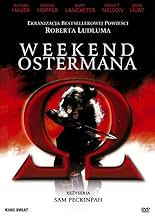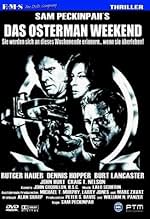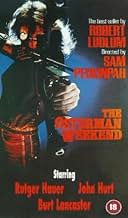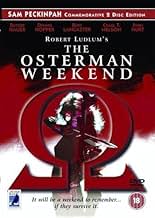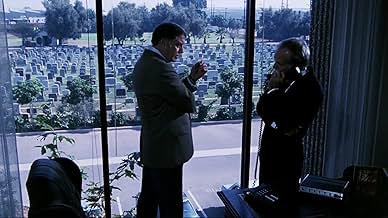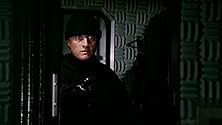IMDb-BEWERTUNG
5,8/10
9873
IHRE BEWERTUNG
Während des Kalten Krieges wird ein umstrittener Fernsehjournalist von der C.I.A. gebeten, bestimmte Bekannte, die sowjetische Agenten des Omega-Netzwerks sind, zum Überlaufen zu bewegen.Während des Kalten Krieges wird ein umstrittener Fernsehjournalist von der C.I.A. gebeten, bestimmte Bekannte, die sowjetische Agenten des Omega-Netzwerks sind, zum Überlaufen zu bewegen.Während des Kalten Krieges wird ein umstrittener Fernsehjournalist von der C.I.A. gebeten, bestimmte Bekannte, die sowjetische Agenten des Omega-Netzwerks sind, zum Überlaufen zu bewegen.
- Regie
- Drehbuch
- Hauptbesetzung
- Auszeichnungen
- 2 wins total
Empfohlene Bewertungen
"The Osterman Weekend" emits the feeling of a last gasp. What was an author's second novel later took this form of a director's last film. Sam Peckinpah was a good choice for directing, with film's like "The Wild Bunch" and "Pat Garrett and Billy the Kid" under his belt, Peckinpah wouldn't hesitate to show the grim world of betrayal and manipulation that Robert Ludlum showed through virtually everyone of his books. With spy films like the James Bond franchise being the most popular, this was the lesser seem side of that coin - the side that is less escapist adventure storytelling for boys.
However, the problems that Sam Peckinpah was going through at his last stages have noticeably affected the film. The intricate plot is there, but feels stitched together in parts, though that may very well be due the studio demanding re-editing work. The action is at times sloppy with very little of the mesmerizing details of Peckinpah's previous action sequences; a car crash even contains multiple repeats of the same angle and makes some disastrous continuity. The other action scenes are a notch or two better, but still far from what they could have been.
But, at least the plot and its many deceptions keep you guessing, right to the last shot. --- 6/10
BsCDb Classification: 13+ --- violence, sexual content
However, the problems that Sam Peckinpah was going through at his last stages have noticeably affected the film. The intricate plot is there, but feels stitched together in parts, though that may very well be due the studio demanding re-editing work. The action is at times sloppy with very little of the mesmerizing details of Peckinpah's previous action sequences; a car crash even contains multiple repeats of the same angle and makes some disastrous continuity. The other action scenes are a notch or two better, but still far from what they could have been.
But, at least the plot and its many deceptions keep you guessing, right to the last shot. --- 6/10
BsCDb Classification: 13+ --- violence, sexual content
When this movie originally came out, five years after CONVOY (a muddled, but in many ways spectacular entertainment), many critics moaned that Peckinpah had yet again displayed his diminished talent. A Ludlum spy thriller, pulp material, given the Peckinpah stamp was not to be taken seriously, period. What nonsense. To begin with, all of Peckinpah's films spring from pulp, and all of them, even the least successful ones, buck and spin with the way Sam applies his vision to the genre conventions he's messing with.
In simple terms, a Peckinpah movie always illustrates the world according to Sam; like a novelist writing in first person, Sam's point of view is the movie's. And that's why they endure today. In THE OSTERMAN WEEKEND, Peckinpah focuses Ludlum's cold war spy antics into a exploration of urban paranoia and governmental abuse. Video as a means to manipulate perception is one of the themes he exploits here, but that's not his main thrust. A group of affluent characters come together for a weekend that turns into a surreal nightmare. The trappings of success that surround this group are not in any way secure enough to withstand the violent, reckless games played on them by a rouge CIA agent (played by John Hurt) who's motive is personal revenge. And that motive, the revenge that fuels his need, in actual fact, has absolutely nothing to do with the affluent group he's playing with. Like the gods in Greek tragedy, the Hurt character uses the Osterman Weekend and its players as pawns, stepping stones, as a way to get at his real goal, the head of the CIA. This notion obviously strikes a chord in Peckinpah; the vision is certainly domestic, but the idea is epic: in the privacy of our homes a kind of virus colors our perceptions and poisons friendships, creates anarchy, and causes death. And the virus - where does it come from? Our own back yard - the CIA.
The film is charged with a constant underlying tension that holds and holds until all hell breaks loose and the affluent house becomes a battle ground. Visually, the movie is stunning. But then, so was CONVOY, but this time Peckinpah has harnessed what he shows and what he wants to say in a simple, tightly wound spy thriller package, Watching the movie today, it's hard to believe that some of the notions that seemed more like the paranoiac mechanics of a potboiler in 1983 have actually come true and don't seem quite as far fetched. By all accounts, Sam Peckinpah was a terribly difficult man, but he was also a visionary film maker who's work gets better and better as the years pass. THE OSTERMAN WEEKEND is not the bad film critics at the time bitched about, and it's not the sad conclusion to a career that started out brimming with possibility. It's a splendid, brilliant - better than brilliant - work of American art by a true American artist: a giant. The world according to Sam is a world that will be looked at a hundred years from now; it will inspire debate, continual analysis, and be ranked with the major artist of the entire 20th century. By 1983,Peckinpah's health may have diminished, but as a film maker he was still powerful and strong as hell.
In simple terms, a Peckinpah movie always illustrates the world according to Sam; like a novelist writing in first person, Sam's point of view is the movie's. And that's why they endure today. In THE OSTERMAN WEEKEND, Peckinpah focuses Ludlum's cold war spy antics into a exploration of urban paranoia and governmental abuse. Video as a means to manipulate perception is one of the themes he exploits here, but that's not his main thrust. A group of affluent characters come together for a weekend that turns into a surreal nightmare. The trappings of success that surround this group are not in any way secure enough to withstand the violent, reckless games played on them by a rouge CIA agent (played by John Hurt) who's motive is personal revenge. And that motive, the revenge that fuels his need, in actual fact, has absolutely nothing to do with the affluent group he's playing with. Like the gods in Greek tragedy, the Hurt character uses the Osterman Weekend and its players as pawns, stepping stones, as a way to get at his real goal, the head of the CIA. This notion obviously strikes a chord in Peckinpah; the vision is certainly domestic, but the idea is epic: in the privacy of our homes a kind of virus colors our perceptions and poisons friendships, creates anarchy, and causes death. And the virus - where does it come from? Our own back yard - the CIA.
The film is charged with a constant underlying tension that holds and holds until all hell breaks loose and the affluent house becomes a battle ground. Visually, the movie is stunning. But then, so was CONVOY, but this time Peckinpah has harnessed what he shows and what he wants to say in a simple, tightly wound spy thriller package, Watching the movie today, it's hard to believe that some of the notions that seemed more like the paranoiac mechanics of a potboiler in 1983 have actually come true and don't seem quite as far fetched. By all accounts, Sam Peckinpah was a terribly difficult man, but he was also a visionary film maker who's work gets better and better as the years pass. THE OSTERMAN WEEKEND is not the bad film critics at the time bitched about, and it's not the sad conclusion to a career that started out brimming with possibility. It's a splendid, brilliant - better than brilliant - work of American art by a true American artist: a giant. The world according to Sam is a world that will be looked at a hundred years from now; it will inspire debate, continual analysis, and be ranked with the major artist of the entire 20th century. By 1983,Peckinpah's health may have diminished, but as a film maker he was still powerful and strong as hell.
The Robert Ludlum book of the same name is excellent, very tense and very well written. I waited ages for this film to come along at the right price (25p off ebay, ha ha), but how disappointed I was when I finally saw it. Maybe it wouldn't be a bad film if it wasn't based on a book, but it is, and a great book at that. Therefore, I have to compare the film with the original as the two can't be separated. Relative to the book, the film is, frankly, rubbish I'm sorry to say. I had such high expectations, but the film bore such little resemblance to the book that had I not known it was called "The Osterman Weekend", I would never have guessed that it was based on the book of the same name.
I gave this film 5/10 simply because I made it through to the end (and Rutger Hauer and John Hurt have done some great stuff), but it was more out of morbid curiosity as to how much more they could butcher the book than for any entertainment value. This was a film that was a product of its time (replete with cheesy music and bad acting) and it hasn't aged well. I'm glad I bought it for 25p because any more and I would've considered it a waste of money.
If it comes up on TV and you have 90 minutes burning a hole in your life, watch it - it isn't dreadful, but it's certainly not great. If you've read the book and are hoping to see it brought to life, or think that you're about to watch another Sam Peckinpah classic, give it a miss, it really isn't worth it.
I gave this film 5/10 simply because I made it through to the end (and Rutger Hauer and John Hurt have done some great stuff), but it was more out of morbid curiosity as to how much more they could butcher the book than for any entertainment value. This was a film that was a product of its time (replete with cheesy music and bad acting) and it hasn't aged well. I'm glad I bought it for 25p because any more and I would've considered it a waste of money.
If it comes up on TV and you have 90 minutes burning a hole in your life, watch it - it isn't dreadful, but it's certainly not great. If you've read the book and are hoping to see it brought to life, or think that you're about to watch another Sam Peckinpah classic, give it a miss, it really isn't worth it.
The Osterman Weekend (1983) was Sam Peckinpah's last film. Years of drug abuse (alcohol, pills etc..) took a devastating toll on the legendary film maker. Desperate for work, he took an uncredited second unit directing job with his buddy Don Siegal's swan song JINXED. He finally got the chance to direct a movie when he was given the job to try and adapt the complex and layered espionage spy thriller The Osterman Weekend. Not pleased with trying to bring to life a novel he really didn't care for, he did the job (albiet with mixed results).
Tanner (Rutger Hauer) is a talking head newsman. He has an eclectic group of friends (Chris Sarandon, Dennis Hopper and Crag T. Nelson). One day, Tanner is approached by a rogue C.I.A. named Fassett (John Hurt) agent to "keep an eye" on Osterman (Craig T, Nelson) because of his ties with certain "red" double agents. But Tanner knows Osterman and doesn't believe that he would be a traitor to his country. After a couple of attempts on his life, Tanner doesn't know who to trust. Is Osterman the traitor that Fassett claims to be? Who's telling the truth?
Not the way I wanted to see Sam Peckinpah end his career but hey, you play with the hand life deals you. People have complained about how confusing the movie is (have you read the book?). Considering with what he had to work with, I say that he did a fairly decent job.
Recommended for Sam Peckinpah fans.
Tanner (Rutger Hauer) is a talking head newsman. He has an eclectic group of friends (Chris Sarandon, Dennis Hopper and Crag T. Nelson). One day, Tanner is approached by a rogue C.I.A. named Fassett (John Hurt) agent to "keep an eye" on Osterman (Craig T, Nelson) because of his ties with certain "red" double agents. But Tanner knows Osterman and doesn't believe that he would be a traitor to his country. After a couple of attempts on his life, Tanner doesn't know who to trust. Is Osterman the traitor that Fassett claims to be? Who's telling the truth?
Not the way I wanted to see Sam Peckinpah end his career but hey, you play with the hand life deals you. People have complained about how confusing the movie is (have you read the book?). Considering with what he had to work with, I say that he did a fairly decent job.
Recommended for Sam Peckinpah fans.
After the utterly ridiculous good-ol'-boy trucker film CONVOY in 1978, Sam Peckinpah languished for five years before returning in 1983 with what would prove to be his final film--THE OSTERMAN WEEKEND, based on Robert Ludlum's maddeningly complex 1972 spy novel.
Despite the fact that it is often cold and sometimes confusing, this film's weakest moments are far superior to even the strongest moments of CONVOY. Rutger Hauer stars as a hard-hitting TV talk show host with a habit of skewering people inside the U.S. government. As this film opens, he is about to have a reunion with five friends of his from the good old days of 1960s radical college politics.
But then a CIA operative (John Hurt) drops a bombshell on him: Those friends of his (Craig T. Nelson, Dennis Hopper, Helen Shaver, Cassie Yates, Chris Sarandon) are supposedly traitors working for the Soviets in a scheme involving germ warfare sabotage. The result is that Hurt, with Hauer's reluctant acceptance, sets up surveillance equipment throughout Hauer's property to document further evidence of his friends' betrayal. When those people start coming unglued, however, more is at stake than just national security or the Cold War. So are peoples' lives!
Though Peckinpah was clearly on his last run while making it, THE OSTERMAN WEEKEND shows that he still could deliver the goods when it came to setting up great action sequences. The final shootout between Hurt's CIA underlings and Hauer and Nelson is edited in such a way as to resemble THE WILD BUNCH, while its actual filming suggests still another Peckinpah masterpiece, STRAW DOGS. Lalo Schifrin's score brilliantly accentuates things. Peckinpah, in depicting the head of the CIA (Burt Lancaster) as the heavy, also clearly makes a statement against America's heavy-handed approach toward Communism in the Reagan era.
All in all, despite its slight confusion, THE OSTERMAN WEEKEND works for those willing to give it a go.
Despite the fact that it is often cold and sometimes confusing, this film's weakest moments are far superior to even the strongest moments of CONVOY. Rutger Hauer stars as a hard-hitting TV talk show host with a habit of skewering people inside the U.S. government. As this film opens, he is about to have a reunion with five friends of his from the good old days of 1960s radical college politics.
But then a CIA operative (John Hurt) drops a bombshell on him: Those friends of his (Craig T. Nelson, Dennis Hopper, Helen Shaver, Cassie Yates, Chris Sarandon) are supposedly traitors working for the Soviets in a scheme involving germ warfare sabotage. The result is that Hurt, with Hauer's reluctant acceptance, sets up surveillance equipment throughout Hauer's property to document further evidence of his friends' betrayal. When those people start coming unglued, however, more is at stake than just national security or the Cold War. So are peoples' lives!
Though Peckinpah was clearly on his last run while making it, THE OSTERMAN WEEKEND shows that he still could deliver the goods when it came to setting up great action sequences. The final shootout between Hurt's CIA underlings and Hauer and Nelson is edited in such a way as to resemble THE WILD BUNCH, while its actual filming suggests still another Peckinpah masterpiece, STRAW DOGS. Lalo Schifrin's score brilliantly accentuates things. Peckinpah, in depicting the head of the CIA (Burt Lancaster) as the heavy, also clearly makes a statement against America's heavy-handed approach toward Communism in the Reagan era.
All in all, despite its slight confusion, THE OSTERMAN WEEKEND works for those willing to give it a go.
Wusstest du schon
- WissenswertesDirector Sam Peckinpah was in ill-health throughout the shoot. The long-term toll of his drug and alcohol abuse suggested to many in the production that he was dying. Peckinpah would go off and take opportune naps, but still completed and delivered his initial cut of this movie on time, despite sickness and exhaustion.
- PatzerThe surveillance cameras installed in the Tanner house each have a red light to indicate that they are working. Surely a camera for secret surveillance would not have a visible indicator for all to see.
- Zitate
Lawrence Fassett: Think of them as fleas on a dog hit by a car driven by a drunken teenager whose girlfriend just gave him the clap. It will help your sense of perspective.
- Alternative VersionenOn the Anchor Bay DVD release there is a rough cut made by Sam Peckinpah which he made showed to the test audience. Because the majority of the audience walked out, from the imfamous sex between Fassett and his wife. The producer wanted Peckinpah to cut the scene out. Once he refuse to made the cuts, he got fired. Other scenes. 1) The sex scene is more extended and shot more wobbly to express how Fassett breaking point for revenge had started. 2) Delete scene of Osterman and Joe talking on the phone about their deal. 3) Extended scene of Virginia flirting with Dick on the phone. 4) There a deleted scene of John Tanner of having an affair with his director Marcia, there wakes up to find her dead. 5) The scene where Tanner and guest are arguing by the dinner table, in the theatrical cut Fassett switches on a Swiss ad, the Peckinpah's cut he has like a big image of Danforth. 6) Alterative ending is juxtapositioned between Tanner searching for his family and the TV studio.
Top-Auswahl
Melde dich zum Bewerten an und greife auf die Watchlist für personalisierte Empfehlungen zu.
- How long is The Osterman Weekend?Powered by Alexa
Details
Box Office
- Budget
- 6.500.000 $ (geschätzt)
- Bruttoertrag in den USA und Kanada
- 6.486.797 $
- Eröffnungswochenende in den USA und in Kanada
- 301.129 $
- 23. Okt. 1983
- Weltweiter Bruttoertrag
- 6.486.797 $
Zu dieser Seite beitragen
Bearbeitung vorschlagen oder fehlenden Inhalt hinzufügen


